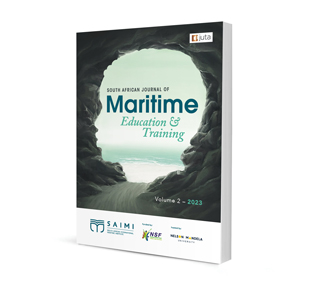
Modern shipping needs to be cybersecure: A South African perspective
Authors: Rossouw von Solms and Suné von Solms
ISSN: 2790-783X
Affiliations: Emeritus Professor, Centre for Research in Information and Cyber Security (CRICS), School of Information Technology, Nelson Mandela University; South African International Maritime Institute; Head of Department, School of Electrical and Electronic Engineering Science, University of Johannesburg; South African international Maritime Institute; Head of Department, School of Electrical and Electronic Engineering Science, University of Johannesburg; South African international Maritime Institute
Source: South African Journal of Maritime Education and Training, Volume 2 Issue 1, p. 25-34
https://doi.org/10.47348/SAJMET/2023/i1a2
Abstract
The traditional standalone operational technology systems that control multiple mechanical systems on board a ship get increasingly integrated with modern information and communications technology (ICT)-related systems. These ICT systems that continuously become interconnected with operational technologies and systems include the Internet-of-Things (IoT), autonomous technologies and the internet with adequate bandwidth etc. The IoT typically employs numerous sensors and captures vast amounts of data, which is processed, transmitted and turned into trusted intelligence to the advantage of all parties involved. Furthermore, modern navigational systems utilise global positioning systems (GPS), radar, sonar and computerised maps. These are used in conjunction with modern communication systems to communicate related data used for accurate navigation. In addition, autonomous technologies are highly dependent on accurate data communicated to them. Thus, it is clear that data is rightly termed ‘the new gold’ in the shipping industry. On the other hand, the maritime industry, like most other industries, is highly vulnerable to cybersecurity attack. As more data is captured, processed and communicated for the more critical shipping activities, the more vulnerable the industry will become to modern cybersecurity threats. Therefore, the interfaces between sensors, devices and different technologies, and the communication of captured data need to be properly secured. Furthermore, many of the shipping industry staff working with technologies where data are captured and communicated need to be educated on how to assist in securing this data. This paper will emphasise the continued use of ICTrelated systems in the shipping industry, and how this digitalisation and smart use of ICT solutions will benefit the maritime industry. In light of this, the purpose of this paper is to highlight the continued vulnerabilities to modern cybersecurity threats, and to discuss some solutions to securing these technologies towards securing the industry as a whole. The paper will also address aspects of educating maritime staff in technology-related areas ranging from the ICT- and cybersecurity-related topics that need to be included in maritime curricula, on the more formal side, to making all staff members more cybersecurity aware, on the more informal side.